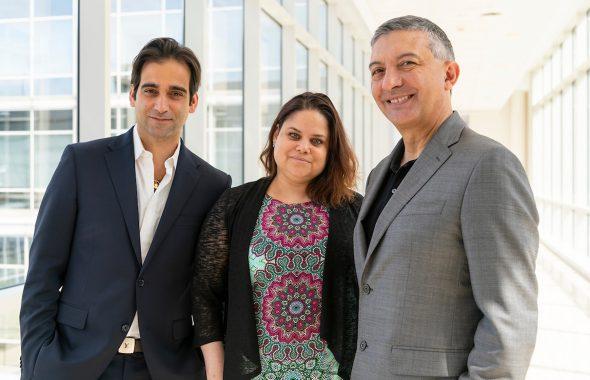
Credit: Fatemi Hossein.
For patients with Type 1 diabetes who don’t respond well to insulin or have other serious medical complications caused by their disease, pancreas transplantation offers hope for a cure. But obese candidates who need a pancreas transplant often are denied the procedure because of poor outcomes, including high rates of incision infections, which are linked to an increased risk for failure and loss of the implanted organ.
But now, surgeons at UI Health have demonstrated that obese patients with Type 1 diabetes can safely receive a pancreas transplant when the surgery is performed robotically. Their findings are published in the journal Transplant International.
“The incidence of obesity among diabetic patients has risen dramatically over the past decades,” said Dr. Mario Spaggiari, assistant professor of surgery in the UIC College of Medicine, and lead author of the paper. “We have shown that by using robotic surgical techniques, this population can be safely transplanted, meaning that those who would have previously been denied can have access to this procedure that can vastly improve quality of life.”
Patients with diabetes who receive a pancreas transplant often can stop taking insulin, but they must stay on an anti-rejection drug regimen. Pancreas transplantation to treat Type 1 diabetes is not a first-line treatment for the disease and is only performed in patients who don’t respond to insulin injections, and who have other severe complications that arise from their diabetes.
The procedure currently is performed using open surgical techniques where a single, long incision is made. The longer the incision, the higher the risk for an infection in the healing incision, which can lead to failure of the implanted organ. Robotic pancreas transplantation can be performed using a small, 5-centimeter incision, where the new organ will be slipped into the body, and four, 1-centimeter incisions for the surgical robot’s arms.
Dr. Enrico Benedetti, professor and head of surgery at the UIC College of Medicine, and his colleagues pioneered the use of robotic surgery for kidney transplantation in obese patients who were routinely denied the procedure because of poor outcomes. Benedetti is a co-author on the paper.
Spaggiari, Benedetti and their colleagues looked back at the records of pancreas transplant patients who had procedures that took place at UI Health over a four-year period ending in December 2018. Forty-nine patients received a pancreas transplant over that time. Seventy-seven percent of the patients had Type 1 diabetes, and 70% had end-stage renal disease requiring dialysis. The average age of the patients was 43 years old.
Patients with body mass indices at or above 30 (indicative of obesity) underwent procedures using robotically assisted surgical techniques. Ten of the procedures were performed robotically, and 39 were performed using traditional, open surgical techniques. Eight of the 10 patients who underwent robotically assisted pancreas transplantation also received a kidney during the procedure. Of the 39 patients who received a pancreas using traditional surgical techniques, 37 received a kidney at the same time.
Compared with patients who underwent traditional open transplantation, those who underwent the robotically assisted procedure had less blood loss, and surgical complication rates were similar in both groups. The length of post-operative hospitalization was shorter for patients who underwent the robotic procedure. None of the patients who underwent robotic pancreas transplant developed any wound complications.
“We think that robotic techniques can also be used to improve outcomes for normal weight patients who need pancreas transplants because of the reduced risk for incision infection, which is linked to a higher risk of losing the transplanted organ,” said Dr. Enrico Benedetti, a co-author on the paper.
Arlys Martinez, 45, of Plainfield, Illinois, was a recipient of a combined pancreas and kidney transplant at UI Health in March 2018. Martinez suffered from Type 1 diabetes since she was a girl, and her diabetes eventually led to kidney failure, which required that she go on dialysis in January. Due to her restricted ability to exercise and water retention caused by the dialysis, she was considered too overweight to undergo pancreas transplantation at other hospitals.
“I was told at other hospitals that I would have to lose a significant amount of weight in order to get the pancreas,” Martinez said. “I was cleared for the kidney, but with the pancreas transplant, they didn’t want to do the surgery because of the large incisions that would be required because of my weight. But it was too hard for me to lose weight at that time because I was so tired and bloated.”
Ultimately, Martinez came to UI Health and was able to receive both a kidney and a pancreas using minimally invasive robotic surgery.
“I am actually a really good eater — I eat mostly organic, and I knew I could lose the weight after the transplant, but only UI Health gave me the chance to prove that,” she said.
Martinez was able to go off insulin after her transplant, and has so far lost more than 20 pounds, and continues to lose weight. She is looking forward to feeling better and better every day.
###
Dr. Ivo Tzvetanov, Dr. Obi Okoye, Dr. Caterina Di Bella, Dr. Pierpaolo DiCocco, Dr. Jorge Almario, Dr. Kiara Tulla and Pearl Ugwu-Dike, of the University of Illinois at Chicago, are co-authors on the paper.
Media Contact
Sharon Parmet
[email protected]
Original Source
https:/
Related Journal Article
http://dx.




